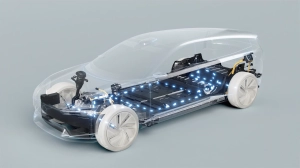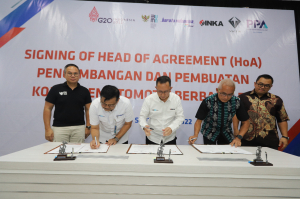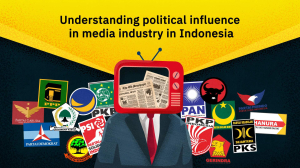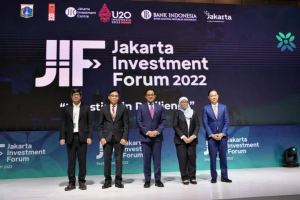VKTR to provide West Java public transportation firm with electric buses
PT Vektr Teknologi Mobilitas (VKTR), a subsidiary of Bakrie and Brothers conglomeration, will supply electric bus fleet to West Java-owned enterprise PT Jasa Sarana. VKTR Chairman Anindya Bakrie said the company would provide solutions to reduce emissions from public transportation.
"Public transportation is the most significant source of carbon emissions," he said on August 31, 2022, during the Head of Agreement signing ceremony between VKTR and Jasa Sarana.
According to Bakrie, the more people taking electric buses, the greater the industrialization of the electric bus.
"If these three things happen: Low carbon emissions, reducing traffic jams and industrialization of electric bus, Indonesia will be very proud of itself. Indonesia has never experienced having an added value for a long time. When the energy transition occurs, it will provide Indonesia with an opportunity," he said.
Bakrie is a conglomerate of manufacturing and infrastructure companies founded in 1942. Meanwhile, VKTR is a spin-off of Bakrie Autoparts, an automotive component manufacturer with over 40 years of experience. Currently, VKTR focuses on the development of batteries and transportation electrification.
Enlarging electric bus fleet
On the same occassion, Jasa Sarana also signed a Memorandum of Understanding with PT Transportasi Jakarta (Transjakarta), a city-owned bus rapid transit system in capital Jakarta. As a result of the agreement, Jakarta and West Java intend to strengthen their cooperation regarding using electric-based public transportation modes in both provinces.
Jakarta launched its first electric bus fleet in March 2022. This was an early measure toward achieving a 50% electric bus fleet by 2025 and a 100% electric bus fleet by 2030. West Java is also preparing a master plan for electricity-based public transportation. Jakarta and West Java have started a sustainable public transportation initiative that may accelerate the national net zero emission target by 2026 if other provinces follow suit.
Bakrie hoped VKTR could become a partner of Transjakarta and Jasa Sarana.
"As a result of VKTR's existence, the government programs that pertain to transportation electrification industry can be supported from upstream to downstream. As reflected in the current agreement between Transjakarta and Jasa Sarana, VKTR is a technology provider who can provide a complete solution for partners," he stated.
Read also: Bakrie offers US$5 billion in investment in Indonesia’s electric vehicle ecosystem
Bakrie said the details of the agreement would be discussed at a later date. It will be a benefit that Jasa Sarana can learn from Transjakarta's 20 years of experience. "As a result, they will be able to learn about the route, the operator, and a better bus," he added.
He said the company planned to establish two factories in Magelang, Central Java, with local manufacturer PT Tri Sakti, and Madiun, East Java, with Indonesian train manufacturer PT INKA. Both factories will produce 1,000 buses each year.
According to Bakrie, the company will invest approximately IDR500 billion to establish an electric bus manufacturer. The investment value does not include the cost of land acquisition or operational expenses. "However, it also includes chassis, life trains and electric bus retrofits," he stated.
Creating a comprehensive ecosystem
"The company is not only planning to manufacture battery-powered buses but also all types of electric vehicles and all the required infrastructure associated with the electric vehicle ecosystem," VKTR CEO, Gilarsi W. Setijono, told Indonesia Business Post on March 17, 2022. Electric batteries, vehicles and charging stations are part of the ecosystem. This includes a digital ecosystem for bus fleets, vehicle owners, drivers, bus operators, taxis, charging stations, workshops, and a payment gateway that links all payment methods to related transactions.
The entire electric vehicle ecosystem will receive a total investment of US$5 billion over several phases until 2029. In Indonesia, most of the manufacturing facilities for EV components will be located, with each business cluster having its development phase based on its needs and readiness.
Assuring that Indonesia's abundant nickel and other resources can be used as components for batteries, Bakrie said the company supports the government's efforts to become part of the global EV supply chain through VKTR.
According to government data for 2020, Indonesia has 985 million metric tons of nickel and 16 million nickel-metal reserves. Indonesia's nickel reserves are primarily available in the eastern part of the country, including in Morowali, Central Sulawesi; East Halmahera and Ternate in North Maluku; Kolaka in Southeast Sulawesi; Gag in West Papua; and East Luwu and Sorowako in South Sulawesi.
"Recognizing the abundance of nickel resources, VKTR initiated the electric bus project, collaborating with countries such as China and the Gigafactory of the UK to ensure that we collaborated and did not reinvent the wheel," Bakrie explained.
Already have an account? Sign In
-
Start reading
Freemium
-
Monthly Subscription
20% OFF$29.75
$37.19/MonthCancel anytime
This offer is open to all new subscribers!
Subscribe now -
Yearly Subscription
33% OFF$228.13
$340.5/YearCancel anytime
This offer is open to all new subscribers!
Subscribe now







